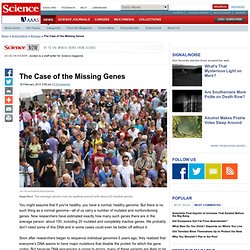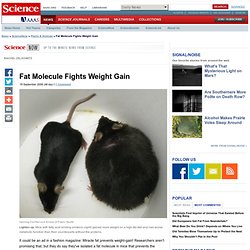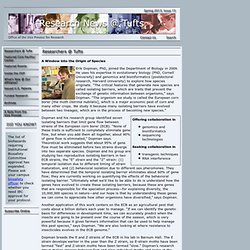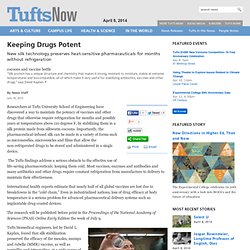

Science News Headlines from ScienceNOW- The latest news from the science world. Long Life Is Still (Somewhat) in Your Genes. The Case of the Missing Genes. You might assume that if you're healthy, you have a normal, healthy genome.

But there is no such thing as a normal genome—all of us carry a number of mutated and nonfunctioning genes. Now researchers have estimated exactly how many such genes there are in the average person: about 100, including 20 mutated and completely inactive genes. We probably don't need some of this DNA and in some cases could even be better off without it. Soon after researchers began to sequence individual genomes 5 years ago, they realized that everyone's DNA seems to have major mutations that disable the protein for which the gene codes. But because DNA sequencing is prone to errors, many of these variants are likely to be mistakes in gene analysis.
Loss of Function Variants - MacArthur Lab. Fat Molecule Fights Weight Gain. It could be an ad in a fashion magazine: Miracle fat prevents weight-gain!

Researchers aren't promising that, but they do say they've isolated a fat molecule in mice that prevents the animals from storing even more fat. The discovery could open a new front in the battle against the bulge if the molecule has the same effect in humans. The word "fat" typically evokes the image of clogged arteries or cellulite jiggling on a thigh.
But fat has a good side, too. Fat cells make up adipose tissue, which helps regulate insulin levels and breaks down dietary fat for energy. Fabricating Genetically Engineered High-Power Lithium-Ion Batteries Using Multiple Virus Genes. Keeping Greenhouse Emitters Honest. A new study has a message for any country claiming to limit its emissions of greenhouse gasses: don't cheat.

Using data gathered by sensors scattered around an urban area, researchers say they can track changes in a city's carbon dioxide output. That means that when a nation says it's complying with an emissions-limiting treaty, scientists may soon be able to see whether it's telling the truth. The Kyoto Protocol, which was adopted in December 1997, has been signed and ratified by more than 190 countries, including 37 industrial or developing nations that agreed to reduce their emissions of carbon dioxide and three other greenhouse gases by 5.2% each year, on average, between 2008 and 2012.
Although the United States signed the treaty, it stands alone as the only signatory to have not ratified the deal. But signing a treaty is one thing. Patterns of carbon dioxide concentrations produced by the team's simulations are similar to those seen in real life, says McKain. University: Research News @ Tufts. A Window into the Origin of Species Erik Dopman, PhD, joined the Department of Biology in 2009.

He uses his expertise in evolutionary biology (PhD, Cornell University) and genomics and bioinformatics (postdoctoral research, Harvard University) to explore how species originate. “The critical features that generate new species are called isolating barriers, which are traits that prevent the exchange of genetic information between organisms,” says Dopman. A Key to Turning Off Stress. Busy lives do more than make our days a series of juggling acts.

Stress has been found to cause depression, cardiovascular disease and infertility, among other disorders, so figuring out how to control stress would benefit millions. Biomedical researchers at Tufts have made some headway—and it doesn’t involve running away to a desert island. Jamie Maguire, an assistant professor of neuroscience at the School of Medicine, and her colleagues have identified new pathways in the brain that are involved in the chemical chain reaction that leads to stress, and they have discovered that a drug used to treat male pattern baldness can tamp down that chemical response. The work could lead to new ways to treat stress-related illnesses.
Of course, stress isn’t always bad. In humans and our close primate relatives, the stress response also depresses biological processes that aren’t useful in an emergency, including digestive and sexual functions. Keeping Drugs Potent. Researchers at Tufts University School of Engineering have discovered a way to maintain the potency of vaccines and other drugs that otherwise require refrigeration for months and possibly years at temperatures above 110 degrees F, by stabilizing them in a silk protein made from silkworm cocoons.

Importantly, the pharmaceutical-infused silk can be made in a variety of forms such as microneedles, microvesicles and films that allow the non-refrigerated drugs to be stored and administered in a single device. The Tufts findings address a serious obstacle to the effective use of life-saving pharmaceuticals: keeping them cold. Most vaccines, enzymes and antibodies and many antibiotics and other drugs require constant refrigeration from manufacture to delivery to maintain their effectiveness. Bacteria cities cannot form on a super-slippery surface, inspired by meat-eating plants. When bacteria start building cities, we’re in trouble.

The normally free-floating cells can gather in large numbers and secrete a slimy matrix that they live within. These communities are called biofilms, and they grow wherever there is a surface to support them. Train with color to fix rapid recognition. BROWN (US) — Scientists have shown that a seemingly irreparable limitation of human perception is treatable with a small amount of training.

“Attentional blink” is the term psychologists use to describe our inability to recognize a second important object if we see it less than half a second after a first one. For example, we’ll notice that first car spinning out in our path, but maybe not register the one immediately beyond it. “Attention is a very important component of visual perception,” says Takeo Watanabe, professor of cognitive, linguistic, and psychological sciences at Brown University. “One of the best ways to enhance our visual ability is to improve our attentional function.”